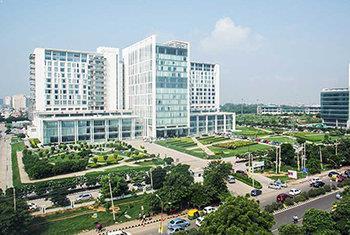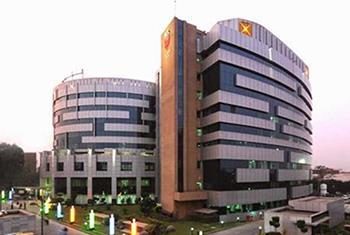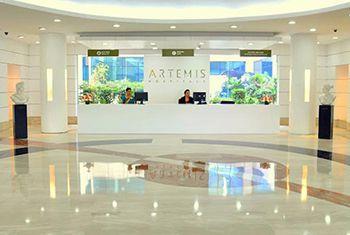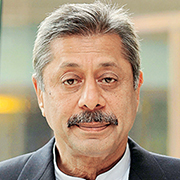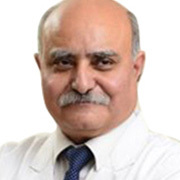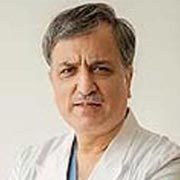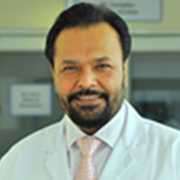- Bariatric Surgery
- Cardiology
- Transplants
- Neurology
- Oncology
- Bladder Cancer Treatment
- Bone Cancer Treatment
- Breast Cancer Treatment
- Colon Cancer Treatment
- Esophagus Cancer Treatment
- Kidney Cancer Treatment
- Leukemia Treatment
- Liver Cancer Treatment
- Lymphoma Treatment
- Lung Cancer Treatment
- Myeloma Treatment
- Prostate Cancer Treatment
- Pancreatic Cancer Treatment
- Ovarian Cancer Treatment
- Testicular Cancer Treatment
- Orthopedics
Pacemaker Implantation Cost in India
What is the Cost of Pacemaker Surgery in India?
Pacemaker Implantation cost in India starts from USD 3200 (INR 266,000) for Single Chamber and USD 6200 (INR 514,000) for Double Chamber. This cost can be less or more depending upon the hospital, experience of doctors, quality and type of pacemaker used and many more parameters.
Patients suffering from a strong heart attack or arrhythmia need pacemaker implantation. A small device is implanted underneath the patient’s skin. It helps to send short electrical impulses to help regulate the heartbeat.
When the heart stops functioning properly, a pacemaker surgery is needed. The procedure is usually conducted under local anesthesia. Minimal discomfort is felt at the implantation site.
Some of the factors that dictate the total pacemaker surgery cost in India are following:
- Pacemaker Implantation cost in India starts from $4000.
- The type of pacemaker used (single chamber or double chamber) eg: Biventricular Pacemaker, Dual Chamber Pacemaker
- The quality of the pacemaker,
- The duration of hospital stay,
- Surgeon’s fees, and Hospital charges.
| Pacemaker Implantation Price | No. of Travelers | Days in Hospital | Total Days in India |
| USD 3,200 | 1 | 1 | 2 |
Get a Free Personalized quote for Pacemaker Implantation in India
Trusted by Patients from 90+ countries
- Connect with 1000+ Specialists
Use the built in communication tools to ask as many questions as needed and get a prompt response. Patient Coordinators will assist you from start to finish.
- Connect with Hospitals around the globe
We hand pick each hospital & only internationally accredited hospitals are included to ensure you will receive high quality care.
- Unbeatable Quotes - Guaranteed
If you receive a lower quote for the same treatment, hospital and doctor, we guarantee we will beat that price.
- Free Medical Advice from Experts
Speak directly to doctors to have all your questions and concerns addressed before finalizing where to get your treatment.
What is a pacemaker device?
A pacemaker is a kind of medical device, which is used to normalize and regulate the rhythm of the heart. It must be known that the heartbeat and rhythm are triggered by electrical impulses that are generated by the heart. When there is an abnormality in the impulse, it results in arrhythmia, a condition in which the heart beats very slowly, irregularly, or too fast.
There are two components present in a pacemaker:
- A pulse generator that detects an abnormal heartbeat and conveys an electrical impulse to normalize the rhythm.
- Electric leads are directly connected to the heart.
What are the different types of Pacemakers used in implantation in India?
There are different types of pacemakers. They include the following:
Permanent heart pacemaker:
This type of device is placed in a small pocket beneath your skin and stays there for the rest of your life.
Demand heart pacemaker:
Equipped with an inbuilt sensing device, this type of pacemaker helps sense slow heartbeat and automatically turns the signals on. When the heartbeat reaches a specific level, the signal turns off automatically
Temporary heart pacemaker:
This type of pacemaker helps with the initial stabilization of a heart patient at the time of the cardiac arrest.
Adaptive heart pacemaker:
This type of pacemaker is responsible for increasing the pace of the heart rate to help meet the body’s changing needs.
Single chamber heart pacemaker:
This pacemaker carries signals to and from one particular chamber of the heart, which is either the right ventricle or the right atrium.
Dual-chamber heart pacemaker:
The pacemaker has two leads that can monitor and eventually deliver impulses to or from the heart chambers.
Why is pacemaker implantation required?
Patients suffering from heart disease, damage to the heart due to aging or heart muscle problems, heart block, and bradycardia atrial fibrillation need pacemaker implantation. A surgical procedure is performed on patients under general anesthesia before it is implanted in the upper chest.
Cardiologists follow pre-established guidelines when placing permanent pacemakers. Patients should be aware of all these guidelines and they should approach their cardiologist for the same. The cardiologist is the best person to determine whether the patient is in need of pacemaker implantation or not. Permanent pacemakers are required for patients suffering from recurring and chronic conditions such as symptomatic bradyarrhythmia.
What happens during Pacemaker Implantation?
Electrophysiologists or specially trained cardiologists perform pacemaker implantation procedures. They are adequately experienced and elaborately trained to perform such procedures. The implantation procedure can be carried out under general or local anesthesia. Fluoroscopy imaging guidance is required for the implantation. The type of implant used dictates the duration of the surgery.
During the procedure, the skin of the chest area is cut and then the device is implanted into the soft tissues in the subclavicular area. This type of procedure is known as pre-pectoral implantation, which is done just above the pectoral muscles.
A cardiologist or electrophysiologist uses fluoroscopy imaging for implanting the pacemaker device at the designated location inside the heart. The leads are threaded through a vein, which is then guided to the right position into the heart muscles is reached. Once done, the pulse generator is connected to the pulse generator unit, which is implanted in the chest. The implantation procedure may take up to a maximum of one hour, or it can take up to several hours depending on the type of device used.
After the cardiologist connects the leads to the pacemaker and the heart, he tests the device to ensure that the electrical impulses are carried to the heart from the pacemaker. He finally makes sure that the patient’s heart rhythm and heart rate are being read accurately and goes on normally.
How to Recover After Pacemaker Implantation?
Pacemakers last up to 10 to 15 years on average and they can then be replaced after the stated period is over. Recovery after implantation is quite quick and the patient is able to recover within a few days. However, restriction of activities and vigorous arm movement is generally advised for the initial few weeks after the surgery. Patients may be required to stay in the hospital a day or two after the surgery. One can start routine activities in just two weeks.
How can Lyfboat assist you getting Pacemaker Implantation in India?
World's Most Trusted Medical Advisory & Discount Platform
Lyfboat is a free advisory platform; we do not charge any fees from patients. In fact, we negotiate the price that Indian hospitals offer. In some cases we are able to reduce the cost by negotiating upto 20% of what Hospitals generally offer. We advise the best treatment from the top hospital/surgeon at best price.
FAQs Regarding Pacemaker Implantation Surgery
Q: How much does a Pacemaker Surgery cost in India?
The average cost of pacemaker surgery in India starts from Rs. 2,97,000. However, the prices may vary depending upon the hospitals in different cities.
Q: What are the symptoms if a pacemaker is failing?
Signs of pacemaker failure include:
- lightheaded, Dizziness
- Palpitations
- Loss of consciousness or fainting
- Breathing problems
- Constant twitching of muscles in the abdomen or chest
- Fast or slow heart rate or both
Q: What is the reason you need a pacemaker?
- To help increase the heart rate if it is too slow
- If your heart is blocked
- Damage to the heart part controlling the rhythm due to a heart attack
- A fast, irregular heart rate that requires medicine or procedures and that result in a heart rate that is too slow
Q: What are the reasons of pacemaker failure?
Causes for a pacemaker failure include:
- Broken or loosen wire between the heart and the pacemaker
- Depletion of the battery
- High potassium in the blood
- Electronic circuit failure
- Electromagnetic interference from devices such as power generators, arc welders, and powerful magnets
- A pacemaker lead gets pulled out
- A change in the condition that need reprogramming of pacemaker
Q: You have a pacemaker. Can you have a heart attack?
A pacemaker is not a cure for heart disease. It cannot prevent heart attacks.
Q: If my pacemaker stops working, will I die?
A pacemaker delivers energy to stimulate the heart muscle to beat. If you stop breathing, your body can no longer get oxygen and the heart muscle will die and stop beating, even with a pacemaker.
Q: What are the side effects of a pacemaker?
Side-Effects of a pacemaker is as follows:
- blood clots
- damage to the blood vessel and heart muscle
- stroke
- heart attack
- bleeding
- infection
- puncture of the lung
- collapsed lung
- allergic reaction to the sedative or anesthetic
- swelling at the site where the generator was implanted
Q: Can I use household appliances if I have a pacemaker?
If you are properly operating household appliances such as microwave ovens, and most power tools cannot damage your pacemaker. But there is a possibility that they may interfere with the proper operation of your pacemaker.
Q: What is the most common age for pacemaker implantation?
Dual chamber pacemakers is the most common type of pacemaker used in the U.S. The average age for dual chamber pacemaker implantation is 70 to 75 years.
Best Hospitals for Pacemaker Surgery in India
Many medical tourists come to India each year. They seek affordable pacemaker implantation benefits at the best Indian hospitals. A majority of cardiac specialty, multi-specialty and super multi-specialty hospitals in India have highly advanced state-of-the-art equipment. They also have a dedicated team of cardiac specialists. They hold great expertise in conducting comprehensive heart care treatment and follow-up cardiac treatments. They are making India one of the best destinations in the world for cardiac treatment.
International patients can now avail the best and the most coveted procedures in India. Some are:
- Advanced pacemaker implantation surgery,
- Minimally invasive valve replacement,
- Robotic heart surgery,
- Coronary stenting and angioplasty,
- Cardiac bypass surgery,
- Aortic valve replacement and
- Percutaneous valvular intervention at an affordable cost.
It is estimated that a majority of these world’s top-rated hospitals conduct cardiac procedures with a 98 to 99 percent success rate. It makes India one of the best countries to get pacemaker implantation.
The pacemaker implantation hospitals in India have a highly trained group of electrophysiologists. They have extensive experience in carrying out all special cardiac procedures.
Consumables and prosthesis are imported from leading international companies. Special arrangements for intensive rehabilitation services and physiotherapy are also made at the best cardiology hospitals in India.
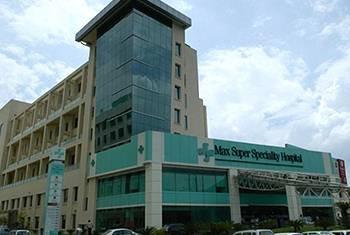
Max Super Specialty Hospital
Saket, New Delhi, India
Max Super Specialty Hospital
Saket, New Delhi, India
After undergoing pacemaker implantation surgery, patients need to attend face-to-face or virtual follow-up appointment with a doctor. He or she needs to do it for the rest of life. The reason why overseas patients prefer to choose India for the procedure is that the country has a huge number of advanced quality cardiac services.The Indian pacemaker implantation hospitals have an experienced team of best cardiac surgeons in India. Most of them are trained from abroad. They are board-certified and assisted by registered technologists.

Written By Dr. Suneet Singh

Verified By Dr. Surbhi Suden
Dr. Surbhi Suden is one of the founders of Lyfboat and a doctor with a renowned name in the Medical tourism industry. She has been working with international patients since 2008 and is a deeply committed professional with a long term vision of transforming the current healthcare scenarios.Six Simple Steps
Our medical advisory platform automatically sends your medical query to our network of expert Doctors, working only at top internationally accredited Hospitals.
You and the medical providers communicate directly via email or your online patient account; our case managers are always available to help you with this.
You receive medical opinions and cost estimates within 24 to 48 hours via email and your online patient account.
Lyfboat empowers you to compare the medical opinions, and discuss the options with our very own doctors who help answer your questions, and guide you in making informed decisions on the best treatment option.
We negotiate your final costs, explore available discount offers, and we handle all your logistics including travel, accommodation, transport, and medical co-ordination.
Get cured, pay hospital after treatment and return home safe. Our care team is available throughout your journey to good health!
Cost Calculator

Top Specialities
- Best Doctors in India
- Best Bariatric Surgeons in India
- Best Bone Marrow Transplant Doctor in India
- Best Cardiologist in India
- Best ENT Doctor in India
- Best Epilepsy Doctors in India
- Best Gastroenterologist in India
- Best Hair Transplant Surgeon in India
- Best Hematologist in India
- Best Hip Replacement Surgeon in India
- Best Infertility Doctor in India
- Best Knee Replacement Surgeon in India
- Best Liver Transplant Surgeon in India
- Best Nephrologist in India
- Best Neurologist in India
- Best Neurosurgeon in India
- Best Oncologist in India
- Best Orthopedic Doctor in india
- Best Ophthalmologist in India
- Best Penile Implant Surgeon in India
- Best Penile Enlargement Doctor in India
- Best Plastic Surgeon in India
- Best Pulmonologist in India
- Best Rhinoplasty Surgeon in India
- Best Rhinoplasty Surgeon in Turkey
- Best Spine Surgeon in India
- Best Urologist in India
- Best Cardiologists in the World
Top Treatments
- Bone Marrow Transplant Cost in Turkey
- Gastric Band Cost Turkey
- Cochlear Implant Surgery Cost in India
- Cancer Treatment Cost in India
- Erectile Dysfunction Treatment Cost in India
- Hair Transplant Cost in India
- Laser Eye Surgery Cost in India
- Penile Implant Surgery Cost in India
- Penis Enlargement Surgery Cost in India
- Spine Surgery Cost In India
- 5000 Grafts Hair Transplant Cost Turkey
- Gastric Sleeve Surgery in Turkey
- Turkey Hair Transplant Package
- Liver Transplant in Turkey
- Penis Enlargement in Turkey
- Kidney Transplant Cost in Turkey
- Knee Replacement in Turkey
- IVF Cost in Turkey
- Proton Beam Therapy Cost in India
- LVAD Cost in India
- Pediatric Liver Transplant Cost in India
- Limb Lengthening Surgery Cost in Turkey
- 5000 Grafts Hair Transplant Cost Turkey
- 5000 Grafts Hair Transplant Cost
- Liver Transplant Success Rate in India
- Liver Cancer Treatment Cost
- Pancreatic Cancer Treatment Cost
- Prostate Cancer Treatment Cost
Best Hospitals for Top Treatments
- Best Blood Cancer Hospital in India
- Best Bone Cancer Hospital in India
- Best Bone Marrow Transplant Hospitals in India
- Best Breast Cancer Hospital in India
- Best Cancer Hospitals in India
- Best Hospital for Brain Tumor in India
- Best Hip Replacement Hospital in India
- Best Heart Hospital in India
- Best Kidney Transplant Hospital in India
- Best Knee Replacement Hospital in India
- Best Liver Cancer Hospital in India
- Best Liver Transplant Hospital in India
- Best Lung Cancer Hospital in India
- Best Neurology Hospital in India
- Best Orthopedic Hospital in India
- Best Spine Hospitals in India
- Best IVF Centre in India
- Best IVF Clinics in Turkey
- Best Hair Transplant Clinic in Turkey
- Best Prostate Cancer Hospital in India
- Best Hospital for Cyberknife Treatment in India
- Best Urology Hospital in India
- Best Hospitals for Pancreatic Cancer Treatment in India
- Best ENT Hospital in India
- Best Kidney Transplant Hospitals in Turkey
- Best Hematology Hospital in India
- Best Lymphoma Treatment Hospitals in India
Latest Articles
- Best Countries for Plastic Surgery
- Best Countries for IVF
- Best Countries for Hair Transplant
- Blood Cancer Treatment Cost
- Brain Tumor Surgery Cost
- Robotic Heart Surgery Cost
- Knee Replacement Surgery Cost
- Penis Enlargement Surgery Cost
- Penile Implant Surgery Cost
- Liver Transplant Cost
- Gastric Band Abroad
- Tummy Tuck Abroad
- Gamma Knife Surgery Cost
- Spinal Fusion Surgery Cost
- Gastric Sleeve Abroad
- Gastric Bypass Abroad
- Scoliosis Surgery Cost
- Heart Valve Replacement Surgery Cost
- Life Expectancy After Kidney Transplant
- Best Country for Rhinoplasty
- Bone Marrow Transplant Success Rate
- Bone Marrow Transplant Cost
- Best Countries for Breast Augmentation
- Heart Bypass Surgery Cost
- Best Country for Cancer Treatment
- Hip Replacement Surgery Cost
- Kidney Transplant Cost
- Breast Cancer Treatment Cost
Disclaimer: Lyfboat does not provide professional medical opinion on the treatment or diagnosis of a particular ailment. All the offered services and information presented on www.lyfboat.com are only for the purpose of public knowledge and cannot substitute the professional consultation of the physician. Lyfboat strongly advice against copying or cloning of its web content and follows the legal protocols for protection of its intellectual property.
© 2024 Lyfboat Technologies Pvt. Ltd. All Rights Reserved.
Please wait
